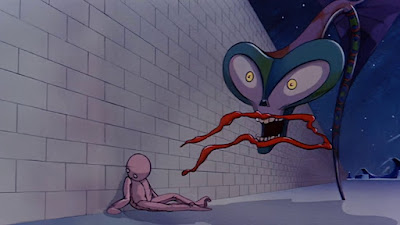The story behind the production of this film is complicated and dramatic and is worth your pursuit. I won't cover it here, concentrating on what Alan Parker did with it. The source album of the same name was one of the band's milestones and causes of its disintegration. But it was massively successful, played as a rock opera with a more coherent narrative line than something like Tommy and criticised its society with a grim determination. Perfect for a downer film at a time when even the newer pop music was also on a years long downer. What Parker had to do was as much logistics as cinematic style. He used the by then advanced state of Gerald Scarfe's animation (an extension of his cover art for the record, used by the band's shows for the tour) and added as much British dourness as he could muster.
The main character Pink was played by rock star Bob Geldof whose lanky frame and intensity came prefabricated from his punk days. This is not a film where many characters crack a smile so Geldof's jaded pallor or dirstorted screams blend well with the hysterical animation style of Scarfe. The major point of contrast lies in Kevin McKeon's performance of Pink as a boy. His seriousness feels wrong on such a young child but that is the intended effect; he's had to grow up young. A scene in which he tries to attach himself to a stranger's father is so worrying we don't have time to feel sadness. Then, later, during the album's great classic Comfortably Numb his act of compassion for a sick animal and then his own illness is as haunting as it is heartrending. The rest of the film is more violent in its imagery of factory processing children, hands reaching from death camp trains, an animation of Pink's marriage running from a beautiful dance of flowers to mental cruetly and violence and far too much more to detail from this many layered movie.
Is it just an extended rock video? No, but you could play extracts that way. Mainly Parker has kept his focus on the narrative that was already there and stitched together a rich quilt of emotive visuals, wisely trusting the music to do much of the work.
The Wall was one of the very few old guard rock albums that broke through to teenagers more inclined to the alternative of punk. The Punk Rock Board of Review, cleared the record for use by persons under twenty and we got into it without the help of midnight headphones. It was a wrenching experience, alleviated here and there by some magnificent music and it had the all important critique of institutions that any teenager felt. It felt weird to be buying it back in 1979 from the same shop I'd bought Never Mind the Bollocks two years earlier but there it was, its perfect playing, arrangements and clean production blaring out: "Hey, teacher leave those kids alone!"
When the movie was announced years later, we lifted our heads, noted it, and stood in the queue at the cinema. In the very last year of my teens I watched with joy and admiration as the adolescent images of relentless cruelty and unfairness rolled out and nodded approval as one of my own generation's heroes played the boomer rock star turned teen Hitler and tiny screaming victim. Parker had marshalled his pieces perfectly. It was cleanly drawn but as emotive as a school kid and, because of that, it felt more complete than the record. The boomer rock epic of alienation and terror really did have a heart. A warm one. That was so good to know.

No comments:
Post a Comment